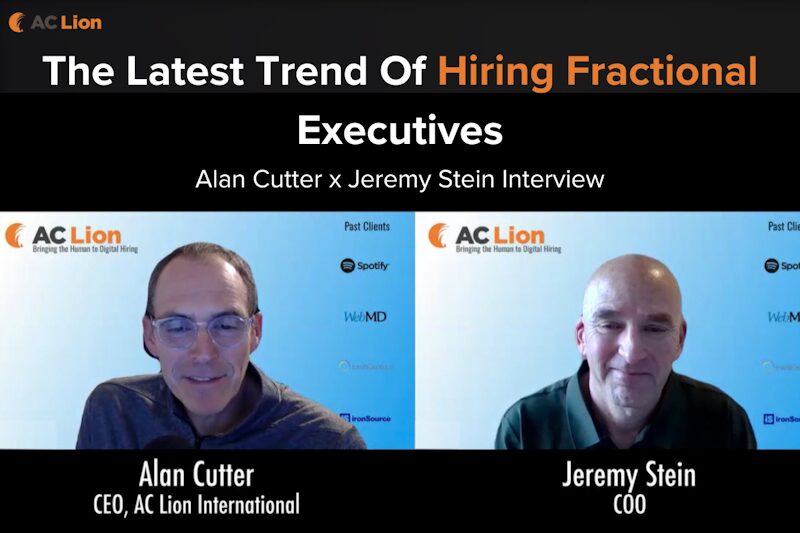The Latest Trend Of Hiring Fractional Executives – Alan Cutter x Jeremy Stein Interview


Alan Cutter: Welcome to the AC Lion Talent Spotlight, where we discuss the latest trend of hiring fractional executives. Today our guest is Jeremy Stein, a COO, who has supported Fortune 500 companies like Sallie Mae and startups that have turned to unicorns like eToro. Welcome, Jeremy.
Jeremy Stein: Nice to be here. Thank you.
OPTIMAL STAGE TO HIRE A FRACTIONAL COO
Alan Cutter: So Jeremy, when would you say is the optimal stage to hire a fractional COO and should it precede the roles of CRO and CMO? For example?
Jeremy Stein: Once there’s an MVP and you’re beginning to test the market, typically companies do bring in a CRO and a CMO, but this would also be the ideal time to bring in a factional COO to partner with them to map out processes. From my experience, companies fail to understand that it’s especially critical during the early stages of a company to make the right decisions regarding technology, how the company’s organized and implementing correct processes. I’ve seen many examples where the wrong technology was implemented causing servicing gaps or difficulties being able to scale that could have been prevented with better decision making upfront.
AVOIDING FRICTION BETWEEN EXECUTIVES
Alan Cutter: You made a great case for hiring a fractional COO post the MVP stage, and perhaps investors and even board members would agree with you, but wouldn’t the CEO typically handle this role until at least the series A post revenue? Couldn’t this cause friction between the executives and if so, how have you managed this in the past?
Jeremy Stein: That’s a really good question. A fractional COO is the perfect solution. It makes it clear that the CEO is in charge. The problem is that a founder typically has a different set of priorities and skills. This is further complicated at the beginning phases of a company, as the CEO is pulled in so many different directions that it leaves little time for proper execution.
And, and that’s where the fractional COO comes in. The COO is the trusted partner to the CEO who takes the vision of the CEO and makes it reality. The COO builds a well-oiled machine and delivers on what sales brings in while ensuring that the company is being fiscally responsible.
In essence, the COO is much more internally focused while the CEO tends to be more externally focused, the COO is the yang to the CEO’s yang.
FRACTIONAL COO AND SCALING REVENUES
Alan Cutter: I love it. I totally agree. One of the challenges that I find my clients are having, probably their number one challenge is that they need to hit their revenue targets so that they can raise their next round of financing. And perhaps the last thing on their mind is hiring a COO or even a fractional COO. But can a fractional COO help in scaling revenues?
Jeremy Stein: Well, you’re exactly right. Revenues and user acquisition are what grows the company and keeps it viable. But you need to deliver on the deals that sales makes. Any good. COO is revenue focused, and I’m no exception to that. As such, the COO must be fully aligned with sales processes from prospecting through delivery departments that I’ve run in the past. That way you can help the sales team with selecting the right software and creating the right handoff processes, the flow through the back office operations.
But maybe most importantly, the COO is responsible for building the right team that is flexible enough to deliver on whatever deal sales brings in, and that includes implementation, fulfillment, support, and back office operations. The worst thing that can happen in a startup is having a back office that limits or is an obstacle for growth. And that’s why it would be ideal to have a fractional COO early on to help set up those processes.
SPECIFIC DELIVERABLES FOR A FRACTIONAL COO
Alan Cutter: So what would be some specific deliverables that one can give to a, to a fractional COO that can really make a difference?
Jeremy Stein: Well, there’s definitely a tried and true toolkit of best practices that I’ve used across small and large companies in many different industries. I actually call it the COO game plan. And by implementing these tools, companies automatically become more efficient, but even more so, a company develops a culture of achievement, employee empowerment, and identifies opportunities and weaknesses quicker.
I have a methodology for yearly planning, KPI identification, interdepartmental handoffs and processes, communication protocols, employee engagement commission and bonus plans, OKR implementation and Voice of customer, just to name a few of them.
With each one of these comes, uh, templates and guidelines and recommended technology to implement them. And further, and maybe most importantly, I’ve learned over time what works and what doesn’t work, and that removes many of the common problems that companies face when trying to implement many of these programs and initiatives.
YOUR GREATEST PROFESSIONAL ACCOMPLISHMENT
Alan Cutter: I’d like to get my hand on some of those templates by the way. So a good COO should be humble and operate behind the scenes, but what would you say is your greatest professional accomplishment?
Jeremy Stein: Wow, my greatest professional accomplishments, um, okay. A previous boss of mine that had joined a three-year-old startup, brought me in to head up business operations. And it was, it was pretty apparent to me that the departments weren’t organized properly.
There was very limited use of technology. They actually had nine temps doing manual data entry, and the processes were a mess, creating inefficiencies and errors. It was so bad and I can’t believe that I said this. I told the CEO that we needed to close down the company for two weeks for me to clean up the mess. I remember like yesterday where he told me that closing the company was a non-starter and that I needed to find a way to keep back office operations and sales fulfilment happening while still fixing the problems.
And he was right. Within the two weeks, I had reorganized the departments and fixed the processes. It took another two months for coding and bringing in new technology, but then we released every one of the temporary employees and continued to fine tune up the operations.
Three years later, we sold the company to JP Morgan Chase and the CEO pulled me aside and told me there was primarily due to the efficiency of the business operations that we were able to sell the company. I thought that was an amazing accomplishment.
YOUR GREATEST PERSONAL ACHIEVEMENT APPLIED TO THE WORKFORCE
Alan Cutter: Very impressive. And if you could top this, what would you say is your greatest personal achievement and how did you apply that to the workforce?
Jeremy Stein: Okay. I ran a marathon in under three hours. In my second attempt, I applied many of the tools that I use in business. Actually, when I thought about how to do that, I created a plan. I used the right equipment, I did a lot of hard work and used a lot of effort, and I used what I learned that works and what doesn’t work. In essence, I set a goal and I achieved it and I’m pretty proud of that.
Alan Cutter: Very impressive all around Jeremy. Tremendously insightful and I just really appreciate your time and hopefully everyone can learn from Jeremy and, if they want to get in touch with you, you can reach me directly. I’m happy to make the introduction. Thank you so much.
Jeremy Stein: Thank you.
